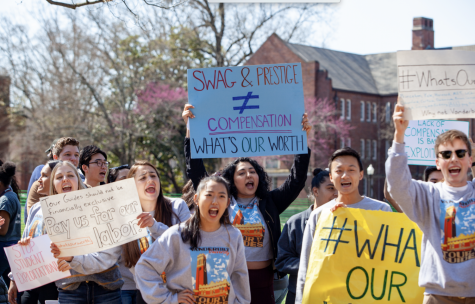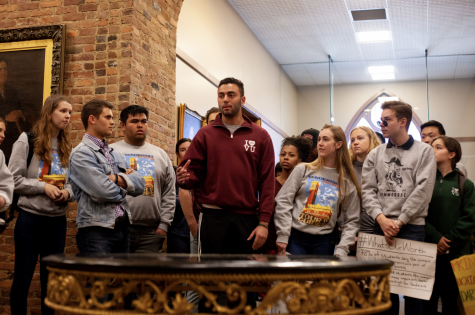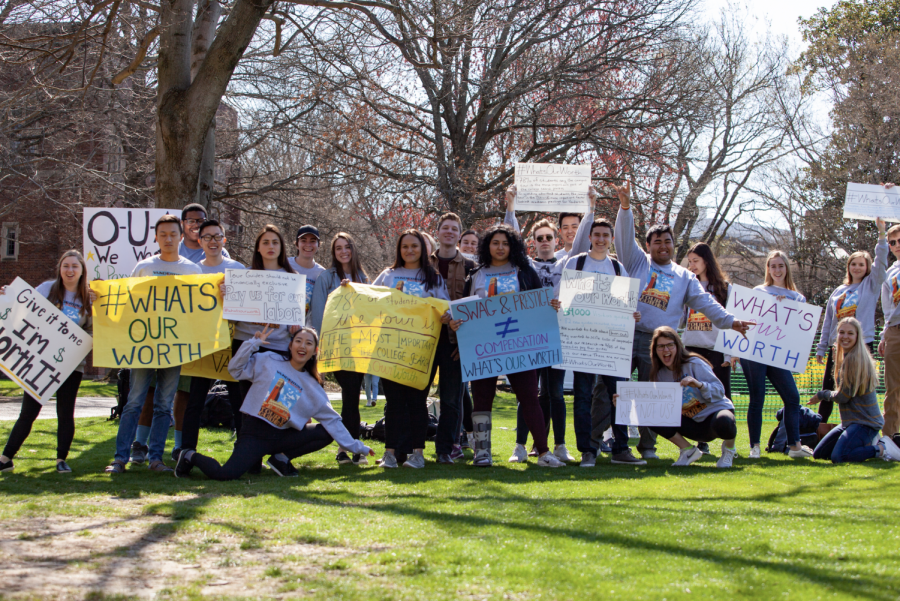“Lack of compensation is basic exploitation,” “what’s our worth?” and “OUA, we want pay” were among the chants that could be heard reverberating across Main Campus on the morning of Mar. 20 as tour guides took to Alumni Lawn to demonstrate in advocacy of compensation for their work.
Outside the Office of Undergraduate Admissions (OUA), student tour guides, who comprise the organization, “AmbassaDores,” vocalized their frustration with regard to their lack of pay, as well as what they say is the administration’s apathetic response to their demands.
“Initially, the executive board had been working with our admissions advisors to plan a town hall, during which tour guides would be able to speak their minds and express their concerns,” AmbassaDores President Télyse Masaoay said.
However, according to Masaoay, it wasn’t until Director of Admissions John Gaines, as well as Dean of Admissions and Financial Aid Doug Christiansen caught wind of these plans, cancelled the town hall with no option to reschedule and repeatedly dismissed the continued efforts of the executive board to communicate their concerns on behalf of the organization, that they resorted to these escalated measures.
“Although the administration offered to meet with me one-on-one, we felt that this solution was inadequate,” Masaoay said. “The entire point was to have tour guides’ voices heard, and one meeting behind closed doors with no tools for accountability does not equate to a promise for action.”
In response to the lack of sufficient administrative action, the executive board made the decision to publicly assemble as an organization, deliberately staking out their position on Alumni Lawn to ensure that the message would be unambiguously conveyed both to the Admissions Office, as well as passing tour groups, Masaoay said.

Vice Provost for University Enrollment Affairs and Dean of Admissions and Financial Aid Doug Christiansen responded to the demonstration with a statement pledging the administration’s commitment to continued conversation.
“I appreciate our tour guides’ concerns and we are committed to further meetings with the Tour Guide Executive Board to discuss the issues they have outlined in their petition and supporting materials,” Christiansen wrote in an email to Hustler staff. “We are grateful for their passion about Vanderbilt and their service to the university. We look forward to continuing the dialogue.”
Following the concurrent tours’ continuation past Alumni Lawn, the demonstrators reassembled and proceeded marching to Kirkland Hall, to deliver a statement directly to the administration, outlining their demands.
In this thirty minute deliverance, during which members of the organization shared their motivations for demonstrating, Masaoay spoke first, spelling out factors that had initially prompted the conversation.
“We were getting a lot of complaints from our members about not being able to be a tour guide and give great tours, while balancing other financial obligations, such as having a part-time job on campus,” Masaoay said in her statement. “We also received feedback with regard to feelings of disenchantment accumulating throughout students’ years here.”
Additionally, in comparing compensation norms across peer institutions, the executive board found that Vanderbilt is one of only seven institutions that does not pay their guides out of the top 25 universities ranked by U.S. News and World Report.
General body members’ testimonies aligned with the executive board’s decision to protest for pay, with some pointing out the lack of representation amongst tour guides in terms of financial inclusivity
“I had to drop out of the tour guide program because I had to take up other paying jobs as a second semester senior who needs to pay their tuition,” Kencell Nixon said. “What kind of message are we sending to prospective students if tour guides are only people with financial stability?”
First-year Maddie Woods said she chose to partake in the demonstration because she believes in recognizing the essential service tour guides provide in promoting the university to campus visitors.
Students also utilized this opportunity to call out the hypocrisy of the administration, noting that tour guides are expected to act as university representatives, yet are silenced upon voicing their concerns.

Despite the success of the movement in garnering around 50 attendees, as well as capturing the attention of administrators, some tour guides chose not to partake in the demonstration.
One tour guide, who spoke on the condition of anonymity, explained that although they endorse the push for compensation, they worry about repercussions of this course of action in terms of affecting the relationship between tour guides and administration, as well as potential logistical implications that have yet to be addressed.
“I chose not to attend the protest not because I don’t support the root cause, but because I am hesitant about this approach and have lingering questions about potential implications of these changes, such as compromising the organization’s status as student-run,” they said. “It’s fine to go against the administration, or the Office of Admissions, whomever. But I will not go against those prospective students and their families who make the effort to visit our campus. I take pride in knowing that I contribute to their experience here, and I would definitely continue giving tours, regardless of whether or not I am paid.”
Despite the hesitance expressed by some members of the organization, today’s efforts were nonetheless perceived as successful to general body members and the executive board alike, and Masaoay is optimistic about the future of the organization, particularly given the university’s receptiveness to the demonstration.
“I definitely feel that today was a success,” Masaoay said. “I am hopeful about the future, and more importantly, I am really excited about this opportunity to make the university a better place.”

